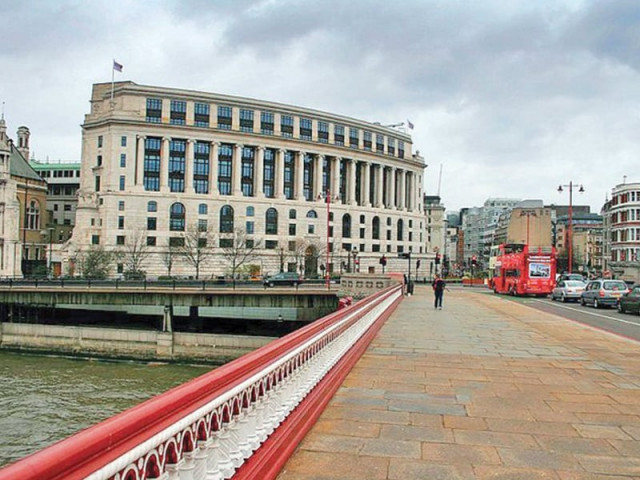Going private: For delisting, Unilever Pakistan faces a higher price
KSE says the consumer goods giant can delist for Rs15,000 per share.

Globally, Unilever is already facing a backlash from investors in India and Indonesia for increasing its royalty fees – the charge that it levies on all of its global subsidiaries in exchange for providing technical expertise from its global headquarters. PHOTO: FILE
Delisting from local bourses got a little more expensive for Unilever Pakistan after the Karachi Stock Exchange (KSE) announced that the global food and consumer goods giant will be required to pay nearly 55% higher than its initial offering price to its minority shareholders if it wants to go ahead with the plan of taking its Pakistani subsidiary private.
In a notice released on Tuesday, the KSE stated that its internal committee that will be supervising the delisting process has recommended a price of Rs15,000 per share for delisting and given Unilever seven days to respond to the price, much higher than the Rs9,700 per share that Unilever had offered when it first announced its intention to delist one of its two Pakistani subsidiaries. A spokesperson for Unilever Pakistan did not respond to requests for comment from The Express Tribune.
If Unilever accepts, it will then be given 60 days to buy back as many shares as possible, following which, the stock will stand de-listed from the stock exchange, regardless of whether or not it succeeds in buying back all of the shares from its minority stakeholders. Those shareholders who refuse to sell with then become shareholders in an unlisted company.

It is this last provision that many investors in Unilever are decrying as unfair. Acacia Partners, a New York-based hedge fund, has written letters to all three stock exchanges asking them to give minority shareholders more room to negotiate directly with Unilever. Arisaig Partners, a Singapore-based asset management company, likewise has a similar position as does Tundra Fonder, a Stockholm-based investment management firm. These firms taken together represent almost half of the 25% of Unilever Pakistan shares that are held by minority investors.
In earlier conversations with The Express Tribune, several minority shareholders had expressed dismay at Unilever’s initial offering price. Most of them had conducted valuations of Unilever Pakistan that suggested a fair price will be significantly north of Rs20,000 per share. They are unlikely to be placated by the Rs15,000 per share offer, even if Unilever decides to go ahead and accept the KSE’s ruling.
But the dispute is not just about price: it is about the mechanism. If Unilever accepts the price that the KSE has decided upon, then the minority shareholders have no choice: they have to sell at that price, or else find themselves holding shares in an unlisted company which would be very hard to value, and even harder to sell. Their only hope at this point is that Unilever decides that the price is too high and goes back on its decision to delist.
That, however, is an unlikely scenario. Unilever would have to pay out nearly Rs50 billion ($503 million) to minority shareholders in order to delist. (The government of Pakistan is likely salivating at the prospect of that foreign direct investment coming into the country.) But in return it gets the ability to run its Pakistani subsidiary away from public scrutiny.
Globally, Unilever is already facing a backlash from investors in India and Indonesia for increasing its royalty fees – the charge that it levies on all of its global subsidiaries in exchange for providing technical expertise from its global headquarters. In India, that royalty doubled from 1.4% in 2012 of revenues to 3.15% of revenues in 2013. In Indonesia, the jump is even more dramatic: from 3.5% last year to 5% this year.
Some investors have alleged that this is a tactic on the part of Unilever to squeeze out more profits for itself at the expense of both minority shareholders and the governments of the emerging economies from which it derives most of its revenues.
By forcing its subsidiaries to pay higher royalty fees, Unilever will lower the reported profits at its subsidiary, while increasing revenue at the Netherlands-based parent company. The lower profits will mean lower dividends and lower share prices for minority shareholders, and also lower the corporate income tax it will pay to the governments in India and Indonesia. The corporate income tax rate in the Netherlands is 25%, lower than 32.5% in India and 35% in Pakistan.
Unilever has not indicated any such plans for its Pakistan subsidiary and it has denied that its increases in royalties will negatively affect minority shareholders in India and Indonesia. But the stock prices of its subsidiaries in both of those countries plummeted upon the announcement earlier this year.
Published in The Express Tribune, March 28th, 2013.
Like Business on Facebook to stay informed and join in the conversation.


















COMMENTS
Comments are moderated and generally will be posted if they are on-topic and not abusive.
For more information, please see our Comments FAQ